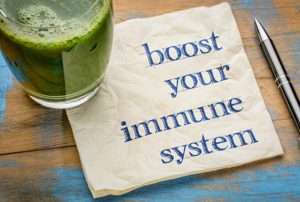Effects of Vitamin C on Stress

Vitamin C by far has been touted to be one of the most essential micronutrients to perform a host of different functions in our body. From healing injuries to regenerating new cells, producing antigens that fight off pathogens, better iron absorption, production of collagen, improving teeth and bone density, Vitamin C has been proved to support a vast number of immune mechanisms in our body.
Besides commonly known to treat scurvy and build our natural defence system, an overlooking feature of Vitamin C is how it helps in managing the body’s stress response.
The adrenal glands, located in our kidneys require Vitamin C to stay healthy and manufacture adrenaline hormones to help us cope with stress. They help you manage cortisol hormone better – the more cortisol made, the more Vitamin C is used.
Therefore, Vitamin C helps in the proper functioning of the entire HPA (Hypothalamic-pituitary-adrenal) axis. This axis is one of the major contributors to our internal homeostasis – a process that maintains steady biochemical reactions and physiological balance in our body.
A high level of stress is directly related to Vitamin C depletion. But the impact is relatively more on our adrenal glands as they are bound to respond to every stress experienced by the body. Therefore, regular Vitamin C intake can have a significant impact on keeping our adrenal glands healthy and functioning.
The pure form of Vitamin C is called ascorbic acid. It has a tendency to get quickly lost either in cooking or when keeping it exposed for a long time (discolouration of cut fruits and vegetables). The same thing happens to Vitamin C internally as well. When experiencing stress, Vitamin C disappears from the bloodstream at an extremely rapid rate.
This means whether you’re doing your regular burpees (physically straining) experiencing good stress, or dealing with tough life situations (emotionally straining) undergoing bad stress, your adrenals need additional Vitamin C.
You can feel it when your body is unable to sustain you during stressful times. Part of the reason is that your adrenal glands are in need of additional Vitamin C to make adrenaline that will manage your stress better.
Even though the RDA for Vitamin C is 65-95 mg, a lot of the studies conducted usually adhere to the intake of 1000 mg easily. There is a growing belief that the current RDA for Vitamin C is outdated mostly because it was set decades ago to ward off scurvy.
Currently, researchers are looking at things differently, by figuring out the amount required to promote health and overall wellbeing. That appears to be much higher than the amount required to prevent deficiencies.
There is also evidence to suggest that prehistoric humans used to consume a large tropical diet rich in a variety of fresh fruits infused with Vitamin C. That being said, the physiological constitution that we have inherited may require larger doses of Vitamin C than the current RDA, perhaps as high as 1000 mg.
In one German Study researchers subjected 120 people to a stressful scenario – a public speaking task combined with math problems. Half of them were given 1000 mg of Vitamin C, others were not. The ones without Vitamin C showed obvious signs of stress like high cortisol levels and high blood pressure compared to the ones who did consume Vitamin C supplements. They reported feeling less stressed.
People found to have high levels of Vitamin C in their bloodstream do not show marked levels of mental and physical stress when subjected to difficult psychological challenges. What’s admirable is they bounce back from stressful scenarios faster than those with low Vitamin C levels in their bloodstream.
Cortisol is the hormone that triggers your “fight or flight” response to stress, allowing you to spring into action when faced with danger. Frequent exposure to stress can result in fatigue (even if you’re rested), weakened immune response, increased frustration, reduced joy, irritability, impaired memory and inability to respond to even the slightest amount of stress. Regular intake of Vitamin C acts as a mood lifter.
Related Product – Immune Booster Tablets
What type of Vitamin C is best?
There are many kinds of Vitamin C available in the market depending on the level of acidity. Ascorbic acid is the purest form of Vitamin C found naturally in foods, both synthetic and dietary. Some people can find it difficult to absorb Vitamin C in ascorbic form and may prefer gentler forms to better suit their needs.
In such cases, Vitamin C with bioflavonoids is comparatively gentler. Bioflavonoids are polyphenolic compounds found in plants. They are essential for ascorbic acid to get fully utilized and metabolized by the body. Simply put, bioflavonoids help in better absorption of Vitamin C into the bloodstream.
Apart from that, flavonoids help to reduce oxidative stress as well. When included in the diet they have been shown to have significant antioxidant properties as well as anti-inflammatory properties.
Therefore, a composite form of ascorbic acid along with bioflavonoids is better as bioflavonoids double the effectiveness of ascorbic acid in the body and are also easier on the stomach.
Related Article – Discover The Amazing Benefits Of Vitamin C
How much to consume?
Vitamin C is water-soluble in nature and quickly excreted out of the body. Therefore, it is to be consumed several times a day, especially when your body is under physical, emotional or environmental stress. Also, when there is a possibility of high infection.
The quantity of Vitamin C may vary from person to person depending on their stress levels. But more stress would definitely require more amount of Vitamin C.
The upper limit for Vitamin C consumption has been recommended to be 2000 mg as doses higher than this can lead to diarrhoea. However, there are a lot of people who resort to taking higher doses of supplements to get a Vitamin C flush in order to cleanse their body. Basically, it is done to figure out the optimal dosage for one’s body.
2000 mg is usually more than sufficient for your daily requirements.
Related Article – Why we need Vitamin C? Health Benefits of Vitamin C
Why go for PLIX Immune Booster?
Plix Vitamin C Immune Booster is easy and convenient to consume. You simply need to take one tablet and drop it in a glass of cold water to see the fizz dissolve right in front of your eyes. It is infused with the goodness of 35 lemons and 18 oranges and has a delicious tropical orange taste that is refreshing.
Consume 1 or 2 tablets daily to boost immunity.
You can also buy our Plant-based protein powder from Amazon here:















